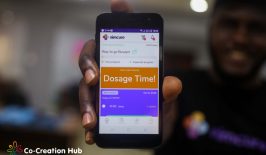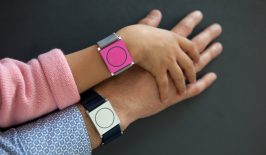The Covid-19 crisis has turned our lives upside down. And it has also shown us, that for good and for worse, we are all connected. We are, quite literally, wherever we are in the world, in this situation together. And thanks to digital technology, there are countless ways we can support each other through the crisis, and use our time and energy to help local and global communities weather the storm.
From sewing masks, to donating to charity and even using your computer power to help find a cure, here are just a few ways you can help out from home right now.
1. Reach out to the vulnerable via post or phone
While the Covid-19 pandemic may be inconvenient and upsetting for a lot of us, for older people, and those with existing health conditions the situation is a lot worse. There are a number of platforms and social schemes developed to lend a hand (or an ear) to older people – and they’re stepping up their work in the face of the crisis. Organisations such as Love for the Elderly, are looking for couch-bound volunteers to spend five minutes of their day to write a hand-written letter to be sent to care homes across the US. In Berlin, where RESET is based, Young Caritas is encouraging volunteers to do the same thing.
Many organisations also offer phone-based services at a national level. For example, in Ireland, volunteers can offer their time to Alone – an organisation which provides direct lines between volunteers and the elderly. The non-profit provides training and support for volunteers to take part in weekly chats over the telephone. Other countries have similar organisations, including Age UK and silbernetz.org in Germany.
Once you’ve caught up with older relatives, maybe check to see whether a similar service is available in your area that could connect you to someone you don’t yet know.
2. Connect with your neighbours
You can also help out closer to home. In cities around the world, notices are appearing in hallways and on lampposts with the contact details of individuals offering help with shopping, dog-walking and more. You can make your own poster, or easier still, download a printable card here which you post through your neighbours letterboxes offering help. The internet can also help you find out if anyone around you is in need. Nextdoor.com, for example, is an online platform designed to bring local communities closer together. Neighbours can post bulletins asking for or offering assistance, as well as spreading information and creating social cohesion between those living in isolation, but in fact just streets apart.
3. Put your tech skills to good use
If you are an experienced coder or programmer you could offer your services to different corona-related projects via the Code4Covid.org platform. Their online tech community has also developed the Coronavirus Tech Handbook, full of tons of resources and information (also understandable for those who aren’t so tech-savvy) on how to use tech for good during this time – from remote working and volunteering, to tips on how to organise effective online events.
4. Share your computing power to help find a cure
You don’t need to be technologically-inclined to do your bit to help find a solution to the crisis. Even simply owning a computer can be enough to contribute – allowing you to join an army of citizen scientists helping researchers find a cure. Started in 2000, Folding@home (named after “protein folding”) is a distributed computing project that simulates the movements of proteins implicated in a variety of diseases. In order to have the processing power to simulate this, the medical researchers behind the project have been tapping into the stagnant power of idling computers in people’s homes. Download the Folding@home program from the project’s website, and your unused processing capacity will automatically join a network of GPUs, crunching numbers and helping scientists better understand and develop life-saving drugs.
5. Help healthcare workers at home…
Hospitals and health centres across the world are currently under unprecedented pressure to provide beds and supplies to tackle the Covid-19 pandemic. In many countries, protecting gear is running low and a simple thing like a face mask is hard to come by, including for the people who need them most: hospital workers, police and fire fighters.
If you have a needle and thread available – you can help out. A number of organisations, and even a number of health centres, have distributed information on how to make your own homemade face masks from fabric. Here’s one step-by-step guide from Instructables and another from the New York Times. Homemade masks are not being accepted by the vast majority of health services, and the World Health Organization has recommended people only wear them if they show symptoms or they are home caregivers. But producing your own could help reduce the supply demands and free up resources for where they are needed most. And considering many people will not show symptoms, even though they are infected, wearing one, or offering one to someone else, lets other people know that you care about their safety.
6. …and abroad too
While European health systems are struggling under the pressure of the Covid-19 pandemic, international medical NGOs need our support more than ever. Think about making a donation to an association like Médecins sans Frontières or the International Red Cross that is experienced at dealing with epidemics and managing emergencies and right now is offering life-saving assistance in countries where the existing healthcare system cannot cope with the expected onslaught of sick people.
7. Support businesses & artists by making the most of online alternatives
Yoga, fitness classes, music lessons, language learning… There are so many things that can be enjoyed online from your home instead of in person. If you have some free time and you know of a business offering this option – take them up on it! Even entertainment venues are moving online, with live DJ sets popping up all over Instagram often linked to Patreon so that you can send some money their way and help DJs, clubs and other artists survive in these uncertain times. UnitedWeStream is a streaming platform for clubs, events and artists. Become a sponsor and you receive a virtual ticket and can bring the digital club to your own home. And it’s not just the major superclubs or big named DJs that are getting in on the action, smaller venues are also moving online. So, even if your favourite club has shut its doors, make sure to check out their social media as more may be going on that you originally thought.
Looking for quieter type of escape? Bookstores in cities around the world are offering door-to-door bicycle or skateboard delivery.
Have a favourite local cafe or restaurant? How about contacting them online and asking for delivery? Or if that’s not an option, if you can buy a voucher that you can use as soon as they’re allowed to open again? If they’re not offering this already, ask them about it and make it clear what you would be willing to pay for. They’ll get more out of it than some much-needed income – your participation is a clear demonstration of your support and solidarity.
8. Stand up for those who can’t #StayHome
Telling people to #StayHome is all well and good, but what if they have no home to go to? Living in overcrowded, unsanitary camps with no, or limited, access to soap and water, refugees have no chance of isolating themselves or protecting their families and loved ones. Consider making a donation to organisations that are delivering lifesaving supplies and support to refugees and displaced people, like UNHCR in Bangladesh and Syria, or Help Refugeees that is working in Calais, Greece, Italy and Lebanon.
German organisation Seebrücke is calling on the EU to evacuate the tens of thousands of people in refugee camps on the Greek islands and bring them into safety. Find our more about the #LeaveNoOneBehind campaign on their website, sign the petition on Change.org or follow it on social media to see how you can get involved.
9. Reconnect with nature
If perhaps you’re finding yourself with free time on your hands, now is a great time to create a small oasis of nature to help local wildlife get by. This could be as simple as making homemade bird feeders from what you have lying around, or planting some bee-friendly plants. With spring just around the corner, not only will this help the local ecosystem, but it’s also a good way of de-stressing during self-isolation.






